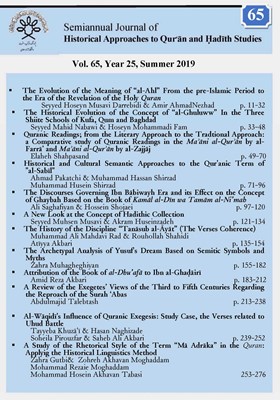The Discourses Governing Ibn Bābiwayh Era and its Effect on the Concept of Ghaybah Based on the Book of Kamāl al-Dīn wa Tamām al-Ni'mah
Subject Areas : -Ali Saghafiyan 1 * , hossein shojaei 2
1 - PH. D. student in Quran and Hadith Studies, Tehran university, Tehran, Iran.
2 - Ph. D. Student in Quran and Hadith Studies, Tehran University, Tehran, Iran.
Keywords: al-Shykh al-Ṣadūq, al-Mahdi’s Doctrine, Kamāl al-Dīn wa Tamām al Ni'mah, Major Occultation,
Abstract :
Ibn Babiwayh's era is one of the most prominent periods in the history of Imamiyah Shiite. Imam's absence from direct access, along with other doubts, challenged the people. In this situation, Ibn Babiwayh, by writing the book Kamāl al-Dīn, attempted to address the most important discourse challenges of his era which had led to the widespread astonishment about the Imam (as). In such a situation, Ibn Babiwayh, one of the greatest scholars of the Imami, began to write the book of Kamāl al-Dīn wa Tamām al-Ni'mah. In this book, he attempted to scrutinize the most important discourse challenges of that period, which created the perplexity and ambiguity surrounding the Mahdi's Doctrine. Since these challenges are not explicitly mentioned in the book, this study attempts to understand this case by analyzing the data of Kamāl al-Dīn wa Tamām al-Ni'mah’s book. The result of this study shows that Ibn Bābwaih has tried to discuss three issues:1) Proof of Divine Hujah as the son of Imam al-Askari; 2) Imam's absence and non-conflict with Imam's duties; 3) The longevity of Imam.
_||_

